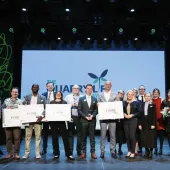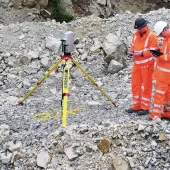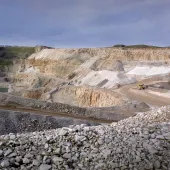MPA Quarries & Nature 2019

First published in the December 2019 issue of Quarry Management
Mineral Products Association event celebrates industry’s contribution to biodiversity net gain
The Mineral Products industry is uniquely placed to deliver biodiversity net gain, with a track record of leaving wildlife in a better state than before development. That was the conclusion from the Mineral Products Association (MPA)’s ‘Quarries & Nature 2019’ event, including the MPA Restoration & Biodiversity Awards, presented by BBC Radio 4’s Farming Today presenter, Sybil Ruscoe, on Wednesday 23 October at The Royal Society, London.
The event attracted a capacity audience of more than 70 leading environmental and conservation organizations and industry operators to celebrate the industry’s continuing contribution to nature conservation. It also explored how the industry can do even more to deliver net gain and showcased some of the best examples of quarry restoration and wildlife conservation anywhere in Europe.
MPA members manage or control an area of land of more than 115 square miles; an area equivalent to a small national park such as the Norfolk Broads. Moreover, the mineral products industry has created at least 8,300ha of UK Priority Habitats and has restoration plans to deliver at least 10,700ha in coming years. Also, between 2014 and 2017, more than 34km of hedgerows were planted.
Best practice was shared through the MPA Restoration Awards, now in their 49th year, and the MPA Biodiversity Awards, in association with Natural England, and were presented by: Dr Tony Juniper CBE, chair of Natural England; Dr Carol Williams, director of conservation at the Bat Conservation Trust; Simon Marsh MBE, head of nature protection at the RSPB; and Dr Nick White, principal advisor on net gain with Natural England.
Presentations on net gain were given by expert speakers Professor David Hill CBE, chairman of The Environment Bank; Tom Butterworth, technical director for biodiversity at WSP; and Kirsty Kirkham, partner of BSG Ecology. Dr Rob Simmons, Associate Professor in Sustainable Soil Management at Cranfield University, presented his work with Tarmac to trial new metrics to measure biodiversity net gain at quarries.
Commenting on the event, the MPA’s chief executive, Nigel Jackson, said: ‘By creating new habitats during quarry restoration, mineral products companies are uniquely placed to increase biodiversity, and this year’s submissions and winners of our prestigious awards once again enrich and extend the legacy the industry has built over the decades.
‘The mineral products industry is a pioneer in the field of nature conservation and is unrivalled by any other UK industry. Our achievements are not fully recognized by government, which consistently fails to appreciate how this industry can help it convert its aspirations for the natural environment into leadership and action on the ground.
‘I hope that this year’s Quarries & Nature event triggers wider recognition and a new conversation with Defra in particular. We are very much part of the solution to the UK’s biodiversity challenges and are ready to play an even bigger role working with key stakeholders to protect and enhance UK biodiversity.’
Award winners
The Cooper-Heyman Cup for outstanding restoration was jointly awarded this year to Aggregate Industries and Tarmac. Aggregate Industries’ work with Yorkshire Wildlife Trust, Middlemarch Environmental and Greenfields Countryside Ltd at Ripon City Quarry, in North Yorkshire, has allowed a diverse mixture of priority habitats to be created, which the judges described as a well-researched and implemented scheme and a great asset to the area. Tarmac’s Broom Quarry, in Bedfordshire, is a former sand and gravel site that has been restored to a mixture of wildflower meadows, wetlands, woodland and farmland, which the judges described a ‘massive transformation’ on what was originally typical, uninteresting, agricultural land. The result is of great value to both the community and to wildlife.
In the Biodiversity Awards, the winner of the Landscape Scale category, in association with Natural England, was Aggregate Industries and the RSPB for Venn Ottery Quarry, near Exeter, in Devon – a 30ha sand and gravel site in the early stages of restoration, predominantly to lowland heathland. The restoration involves partnership with RSPB with heathland and meadow creation, plus specific features including an orchard and bat roost. The connectivity of habitats, both within the site and beyond into the surrounding countryside, is particularly impressive, as the collaborative partnership with RSPB is strong, and involves local communities.
The overall winner of the Planned Biodiversity-led Restoration category was CEMEX and Northumberland Wildlife Trust (‘Save our Magnificent Meadows’ Initiative) for the Divethill Quarry Farm Extension Area, Capheaton, Newcastle Upon Tyne – a fantastic example of progressive restoration of a rock quarry to create an attractive landform and a mosaic of species-rich, locally important and distinctive ‘whin’ grassland, agricultural grassland, woodland and hedges, and open water. The judges were impressed by the clear plan to deliver a range of habitats and realize the unique opportunity presented by quarrying to deliver regional priorities and wider landscape-scale benefits.
In the Biodiversity ‘Innovation’ category the overall winner was Hanson’s Floodplain Forest Nature Reserve (Manor Park Quarry), near Milton Keynes, where the restoration scheme has involved the creation of lakes, ponds, wet woodland, swamp, marsh, fen and reed beds. These are transforming the landscape into a network of habitats which link with the main river, the Great Ouse. Channels have been engineered so that floodwater flows at different times and levels via inlets upstream and downstream, oxygenating the water, trapping silt and helping to control pollution. The project was undertaken in partnership with The Parks Trust, Milton Keynes. The judges were particularly impressed by an ambitious scheme going beyond requirements and realizing opportunities presented by the location, ensuring the habitats are an integral and active part of the floodplain. This benefits a wide range of wildlife, landscape enhancement and other ecosystem services, including flood and water management.
Uniquely placed for Net Zero and Net Gain
During his introductory address at Quarries & Nature 2019, Nigel Jackson, chief executive of the MPA, said the mineral products industry has and will continue to play a vital role in delivering net zero carbon efficiency and biodiversity net gain. He went on to set out the industry’s actions and showcase its achievements, whilst seeking recognition for the role it plays in protecting nature. The following is the full text of his speech:
“These are serious times for far too many species, habitats and our planet.
I know that, MPA knows that, that is why we have not been wasting the last 30 years doing nothing. We have focused on delivering action rather than just adding to too much hot air.
Next year COP 26 is in Glasgow, this will be another important step towards confronting the harsh climate reality we all face. I think it will prove to be the most ‘can do’ yet, I hope so.
The MPA will be actively engaged as best we are able. Sticking to the science, staying practical and proportionate and guided by the evidence. Confronting our responsibilities, highlighting our practical solutions and responses, and playing our part in the collective journey to Net Zero by 2050, I stress by 2050.
Determination and transparency will underpin our approach, not rhetoric, not exaggeration, not denial, not greenwash.
Some say ‘industry is doing nothing about climate change’ or more accurately global warming, or biodiversity loss, our twin and linked challenges, Net Zero and Net Gain.
We are. We have a long and proud legacy when it comes to environmental action and as MPA represents over 90% of the mineral products industry, it means something.
Our Quarry Restoration Awards have been running for 49 years, showcasing hundreds of restored quarry sites all over the UK.
MPA continues to maintain the industry Restoration Guarantee Fund which has been running for over 40 years, an industry pledge that enables local authorities to claim for unfinished restoration of quarries if an MPA producer member goes bust. An unrivalled commitment recognized in planning guidance, a vote of confidence by the industry, in the industry, as no claims have ever needed to be made.
In 1998 we agreed our four-point plan for National Parks with members yielding up old planning permissions, removing the possibility of quarrying in certain areas. That policy is being refreshed in light of prevailing government policy and once the Government has responded to the Glover Review, we will publish it.
In 2005 we formed our partnership with English Nature, now Natural England, to showcase MPA members’ biodiversity achievements.
In 2006 we published our first annual Sustainable Development report; 13 years later we now produce five reports every year evidencing environmental performance in marine aggregates, cement, concrete, industrial lime and all mineral products.
In 2007 we produced our first ‘carbon advice card’ setting out the measures members could take to reduce their carbon footprint, we are currently updating that.
In 2009 we were the first UK industry to launch a Biodiversity strategy. I am not aware that any other industry even has such a strategy.
In 2011 we launched our carbon portal supported by the Carbon Trust giving further guidance on energy and carbon reduction to members.
In 2013 we launched our virtual National Nature Park which now hosts 80 sites restored for wildlife and with public access, field study or education centres, nature trails, many managed by or in liaison with the Wildlife Trusts and RSPB.
In 2015 we launched the first Quarries & Nature event, a two-yearly celebration of the industry’s contribution to nature.
And in 2017 we launched the MPA Charter which sets out our seven Strategic Priorities, of which Climate Change & Energy and the Natural Environment are but two. We also launched our Water Strategy.
And this year we are launching our new Good Neighbour Scheme aimed at building more trust with local communities.
In the first 10 years of the MPA’s life our members have planted 1.5 million trees and 100km of hedgerows. Members have also built 40km of dry-stone walls. They have already created more than 8,000ha of priority habitats with at least another 11,000ha planned.
This year we have published papers evidencing that we are recycling or reusing 82 million tonnes per annum of construction waste either as aggregate or to enable land restoration. The highest use per capita in Europe and, therefore, probably in the world. That is 30% of total aggregate supply, taking the pressure off the need to release primary resources.
So, like countless other scientists and practitioners, we too have been getting stuck in over recent decades, practitioners not preachers.
Unlike some other industries who have a far greater impact on the environment and many who fuel imports exporting their impacts, we pay over £1 billion per annum in environmental taxes. Unlike certain harmful activities we are not subsidized. No public money for our public goods.
Unlike many industries, we are not deforesting at scale to make way for damaging agriculture elsewhere in the world. Unlike many industries, we have reduced our production carbon emissions from cement by 51% since 1990, far better than the UK overall.
Real, measured improvements, not conjectural.
We are strengthening our carbon road map to ensure that notwithstanding the inevitable footprint our production creates, our products in use will counterbalance it over their whole life. If we can get to net zero before 2050, we will.
But we will not join those who arbitrarily nominate unrealistic and opportunist target dates for short term PR gain. This is not a time for empty gestures and virtue signalling. These issues are genuinely complex and not easy to resolve.
Quick easy wins are fine and may make us feel good, but we need to realize that it will take time to transition to sustainable long-term changes at scale. Changing our historical and existing means of production is a massive challenge requiring both innovation and investment, and crucially, time, time we know is precious. Regulation alone will not be enough, incentives to accelerate technological progress will be needed.
We are determined to contribute to achieving Net Zero whilst also creating Net Gain. Net Zero, Net Gain.
All we ask is for is parity of treatment across all business and industry activity using a balanced scorecard approach which links demand and need with supply. No more singling out, everyone subjected to equal scrutiny.
The consumer must also ‘make the link’ between their quality of life and the resources they need to maintain it. Consumers and society drive demand for our products for good reasons. Our products are essential to our quality of life, they enable us to be civilized by being safe, secure, healthy, protected and connected.
Above all, I would say this is not a time to exacerbate divisions. There should be no ‘them and us’, on our treasured planet there can only be ‘us’.
Our industry is as committed to the environment as anyone else. We will continue to work with valued friends and partners to share, listen and learn and rise to the challenges. This long-term industry has not only built a rich legacy of biodiversity assets over the last 50 years, but is itself adapting and preparing for the next 25 years, the next generation, with vigour and resolve and goading ourselves to go further and faster.”
- Subscribe to Quarry Management, the monthly journal for the mineral products industry, to read articles before they appear on Agg-Net.com








